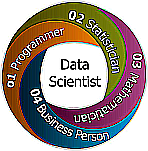35 views
Skip to first unread message
Ged Byrne
Feb 13, 2017, 7:09:07 AM2/13/17
to flow-based-...@googlegroups.com
Hi all,




Expect to see lots of roles that involve someone who is better a X that a Software Engineer and better at Software Engineering than an Xer. There will be many people doing these roles and many of those (but not all) will be blue collar jobs. There will be very few software engineers and they will probably organize themselves into a very selective profession with high barriers to entry,.
The job of coder will soon go the way of the scribe. Once the skill of writing was so scarce people could do it for a living. Monks sat there all day just copying text. Like coders today they spent more time on making the text look pretty than actually getting the job done.
Once literacy reached a certain level writing was just a necessary skill possessed by everyone. That same will happen for the coder.
In recent years the computer aided industries have displaced other specialist roles such as the type-setter. The same will happen for the coder.
The ability to code will just be another skill required across a wide range of jobs. For that to happen the nature of coding will have to change, which is where FBP comes in.
FBP sits in the DataFlow paradigm, which makes it a relative of the spreadsheet.
Go into any financial organisation and you will find people using spreadsheets for all sorts of tasks that 30 years ago required a programming.
This is why programmer's don't like spreadsheets. They had being on the 'displaced' side of the job market. They're used to being the ones doing the displacing.
So there will be no blue collar job called 'coding' but there will be plenty of jobs that involve programming a computer, probably using a range of languages that we will refuse to recognize as code. Our recognition won't matter, because they'll get the job done at a fraction of the cost.
At the moment we coders live in a cosy bubble thanks to the scarcity of our skills. That bubble won't last for ever.
This is why the opening to Paul's book is so important.
"A meeting is called of all the people involved - not just programmers and analysts, but users and operations personnel as well. The essential logic of the program is put up on the wall, and the program designers walk through the program structure with the group. During the ensuing discussion, they realize that two new modules have to be written and some other ones have to change places." http://jpaulmorrison.com/fbp/intro.shtml
The vision is of the coder as a team member contributing a particular skill and syntactic knowledge within a team where semantic understanding of the system is shared by everybody.
That is only the beginning. Unless you work at a highly specialised roles in cloud datacenter you won't work directly with operations, just the platform services they maintain. I expect the programmer and analyst roles will merge using a range of specialized domain language similar to HTML, BPMN or R. There will also be those skilled at quickly training AI systems through the careful selection of datasets.
A good example of this emerging today is the data scientist. I recommend the following on Quora: https://www.quora.com/Do-data-scientists-code
I'd like to draw particular attention to this quote: "A data scientist is someone who is better at statistics than any software engineer and better at software engineering than any statistician."
Here are lots of diagrams here explaining the breakdown of skills for a data scientist. Some mention programming, most do not: https://techinfographics.com/data-science-industry-explanation
Expect to see lots of roles that involve someone who is better a X that a Software Engineer and better at Software Engineering than an Xer. There will be many people doing these roles and many of those (but not all) will be blue collar jobs. There will be very few software engineers and they will probably organize themselves into a very selective profession with high barriers to entry,.
All of these components will need to talk to each other and work together. They'll do this over a flow network and that will need designing. Nobody will think of the flow network designer as a coder. He will probably be a white collar worker.
The transformation will be driven by hard economics, not high minded ideals.
Regards,
Ged
On Sat, 11 Feb 2017 at 15:52 Paul Morrison <jpau...@gmail.com> wrote:
Hi Tim,
I believe I was predicting an application development society more similar to your penultimate paragraph - maybe I didn't express myself too well! I have always said that FBP programs are "bossless", and I don't think a lower class of "code monkeys" fits in with that vision.
I really don't like the term "code monkey", and I have always believed FBP will eventually remove the necessity for this kind of work. The ideal of FBP is that most applications can be constructed by drawing diagrams - using something like DrawFBP, with a whiteboard only being used in the early stages, if at all - with only a few new components needing to be constructed.
...Snip...
On Sat, Feb 11, 2017 at 5:04 AM, timtheli0n <tim.t...@gmail.com> wrote:
Dear Paul,
...Snip...
But in order to aim for such a goal, we need something other than mere education. We need to approach the development with the right mindset and most importantly, with our own free and individual spirit which condemns such hierarchical structures of labor and aims for a more Proudhonian society of truly free and equal engagement between individuals.
Regards,
Timothy Hobbs
Paul Morrison
Feb 13, 2017, 11:45:21 AM2/13/17
to flow-based-...@googlegroups.com
Totally agree, Ged! You make some really important points.
Re your phrase, "probably using a range of languages that we will refuse to recognize as code", I wouldn't dare accuse modern-day programmers of narrow-mindedness, but your point is one of the reasons I keep stressing that no one language (JavaScript, anyone?!) can do everything. In the early days of programming we had RPG - "remains a popular programming language on the IBM i operating system" (Wikipedia) - SNOBOL, which was IIRC a pattern-matching language, and, as Ged says, spreadsheets, and on and on... And by the way, what happened to macro languages - I could make them sit up and do tricks! :-) There is no way that a single language, or even a single syntax, can encompass all these differing viewpoints...--
You received this message because you are subscribed to the Google Groups "Flow Based Programming" group.
To unsubscribe from this group and stop receiving emails from it, send an email to flow-based-programming+unsub...@googlegroups.com.
For more options, visit https://groups.google.com/d/optout.
John Cowan
Feb 13, 2017, 12:56:04 PM2/13/17
to flow-based-...@googlegroups.com
On Mon, Feb 13, 2017 at 11:45 AM, Paul Morrison <jpau...@gmail.com> wrote:
And by the way, what happened to macro languages - I could make them sit up and do tricks!
The m4 general-purpose macro language is standard equipment with Linux, *BSD, MacOS, and Cygwin. The manual is available at https://www.gnu.org/software/m4/manual/m4.html.
However, most macroprocessors are part of a language nowadays. The most advanced such language-with-macroprocessor is Scheme.
--
John Cowan http://vrici.lojban.org/~cowan co...@ccil.org
You cannot enter here. Go back to the abyss prepared for you! Go back!
Fall into the nothingness that awaits you and your Master. Go! --Gandalf
Tom Young
Feb 14, 2017, 3:28:25 PM2/14/17
to Flow Based Programming
and the most widely available language with macro capability is C.
Tom
Young
47 MITCHELL ST.
STAMFORD, CT 06902
When
bad men combine, the good must associate; ...
-Edmund
Burke 'Thoughts on the cause of the present discontents' , 1770
Reply all
Reply to author
Forward
0 new messages
